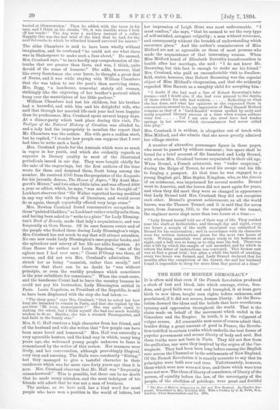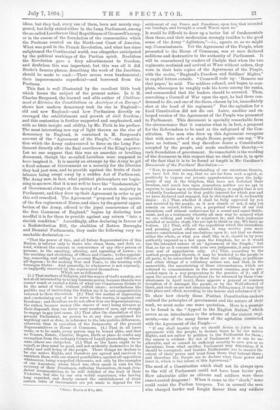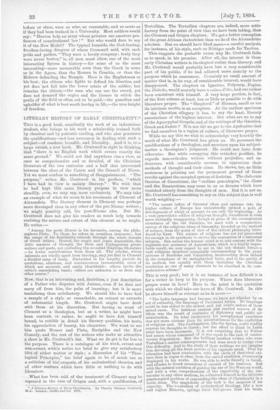THE RISE OF MODERN DEMOCRACY.* IT is often said that
even if the French Revolution produced a slush of last and blood, into which courage, virtue, free- dom, and good faith were cast and trampled, it at least gave birth to new ideas, taught men rights before unknown, and proclaimed, if it did not secure, human liberty. At the Revo- lution dawned the ideas and the beliefs that have overthrown tyranny and oppression throughout the world. That is the claim made on behalf of the movement which ended in the Consulate and the Empire. In truth, it is the vulgarest of vulgar errors. All reasonable men must of course admit that, besides doing a great amount of good in France, the Revolu- tion testified to certain truths which underlie the best forms of popular government and secure liberty of body and soul. But these truths were not born in Paris. They did not flow from the guillotine, nor were they inspired by the orgies of the Car- magnole. They had been born long before among the English race across the Channel or in the settlements of New England. Of the French Revolution it is exactly accurate to say that its principles were both new and true. Unfortunately, however, those which were new were not true, and those which were true were not new. The ideas of liberty of conscience, of liberty of the person, of equality before the law, of the sovereignty of the people, of the abolition of privilege, were great and fruitful • The Rine of Modern Demooraoy in Old and New England. By Charles Bor. geaud. Translated by Mrs, Birkbeek HIS. With a Preface by O. H. Firth, M.A. London ; Swan Sonnonsehein and Co. 1894, ideas, but they had, every one of them, been not merely sug- gested, but fully stated either in the Long Parliament, among the so-called Levellersor ideal Republicans of Cromwell's army, or in the course of the foundation of the communities which the Puritans created on the North-east Coast of America.
What was good in the French Revolution, and what has since enlightened the Continental world, was altogether anticipated by the political workings of the Puritan spirit. Doubtless the Revolution gave a fiery advertisement to freedom, and doubtless this was important, but this was all it did. Burke's famous phrase, describing the work of the Jacobins, should be made to read :—Their errors were fundamental; their improvements superficial—and borrowed from the Puritans.
This fact is well illustrated by the excellent little book which forms the subject of the present notice. In it M. Charles Borgeand, the learned and able author of Etablisse- ment et Biivision des Constitutions en, Amerique et en Europe,* shows how modern democracy took its rise in England— old and new England—and how Puritanism directly en- couraged the establishment and growth of civil freedom; and this contention is further supported and emphasised, and with no little insight and ability, by Mr. Firth in his preface. The most interesting new ray of light thrown on the rise of democracy in England, is contained in M. Borgeaud's account of the "Agreement of the People,"—the constitu- tion which the Army endeavoured to force on the Long Par- liament directly after the final overthrow of the King's power. Let no one suppose that this was an anarchic or levelling document, though the so-called Levellers were supposed to have inspired it. It is merely an attempt by the Army to get a fixed scheme of Government as a security for the liberties they had just won, and to provide against the fruits of their labours being swept away by a sudden Act of Parliament.
The Army saw, in fact, what political philosophers are begin- ning to see now, that it is not well to have the "fundamentals" of Government always at the mercy of a scratch majority in Parliament, and they drew up their Agreement in order to get this evil remedied. The Agreement " proposed by the agents of the five regiments of Horse, and since by the general appro- bation of the Army, offered to the joynt concurrence of all the free Commons of England," begins by declaring how needful it is for them to provide against any return " into a slavish condition." Accordingly, after declaring in favour of a Redistribution Bill, the abolition of Rotten Boroughs and Biennial Parliaments, they make the following very re- markable declaration :— "That the power of this, and all future Representatives of this Nation, is inferior only to theirs who &use them, and doth ex- tend, without the consent or concurrence of any other person or persons, to the enacting, altering, and repealing of Lawes ; to the erecting and abolishing of Offices and Courts ; to the appoint- ing, removing, and calling to account Magistrates, and Officers of all degrees ; to the making War and Peace, to the treating with forraigne States : And generally, to whatsoever is not expressly, or implyedly reserved by the represented themselves.
Which are as followeth,
(1.) That matters of Religion, and the wayes of God's worship, are not at all intrusted by us to any humane power, because therein wee cannot remit or exceed a tittle of what our Consciences dictate to be the mind of God, without wilfull since : neverthelosse the publike way of instructing the Nation (so it be not compulsive) is referred to their discretion. (2.) That the matter of impressing and constraining any of us to serve in the warres, is against our freedome ; and therefore we do not allow it in our Representatives ; the rather, because money (the sinews of war) being alwayes at their dispose% they can never want numbers of men, apt enough to engage in 5ny just cause. (3.) That after the dissolution of this present Parliament, no person be at any time questioned for anything said or done, in reference to the late publike differences, otherwise than in execution of the Judgments of the present Representatives or House of Commons. (4.) That in all Laws made, or to be made, every person may be bound alike, and that no Tenure, Estate, Charter, Degree, Birth or place do confer any exemption from the ordinary Course of Legall proceedings, where- unto others are stibjected. (5.) That as the Laws ought to be equall, so they must be good, and not evidently destructive to the safety and well-being of the people. These things we declare to be our native Rights, and therefore are agreed and resolved to maintain them with our utmost possibilities, against all opposition whatsoever, being compelled thereunto, not only by the examples of our Ancestors, whose blood was often spent in vain for the recovery of their Freedomes, suffering themselves, through frau- dulent accommodations, to be still deluded of the fruit of their Victories, but also by our own wofull experience, who having long expected, and dearly earned the establishment of these certain rules of Government are yet made to depend for the
*Paris ; Morita a F.io, 1893. settlement of our Peace and Freedome, upon him that intended our bondage, and brought a omen Werra upon us."
It would be difficult to draw up a better list of fundamentals than these, and their moderation strongly testifies to the good sense of the Army " Agitators,"—i.e., agents or, as we might say, Commissioners. Yet the Agreement of the People, when presented to the House of Commons, was at once declared seditious and destructive to the authority of Parliament. It will be remembered by readers of Carlyle that when the two regiments mutinied and arrived at Ware without orders, they wore in their hats copies of the Agreement of the People, with the motto, "England's Freedom and Soldiers' Rights," in capital letters outside. "Cromwell rode up : ' Remove me that paper,' he said. The soldiers refused, and began to com- plain, whereupon he roughly rode his horse among the ranks, and commanded that the leaders should be arrested. Then, convoking a Council of War upon the spot, he had three con- demned to die, and one of the three, chosen by lot, immediately shot at the head of his regiment," But the agitation for a fixed Constitution did not die out. Later, another and en- larged version of the Agreement of the People was presented to Parliament. This document is specially remarkable from the circumstance that it contains what is, in fact, a proposal for the Referendum to be used as the safeguard of the Con- stitution. The men who drew up this Agreement recognise that with mere acts of a single House, people can say, " We have no bottom," and they therefore desire a Constitution accepted by the people, and made unalterable thereby,—a rock-foundation of government. So remarkable is the wording of the document in this respect that we obeli quote it, in spite of the fact that it is to be found at length in Mr. Gardiner's Documents of the Puritans' Revolution:- `° Now, to prevent misunderstanding of our intentions therein, we have but this to say, that we are far from such a spirit, as positively to impose our private apprehensions upon the judg- ments of any in the kingdom, that have not forfeited their freedom, and much less upon yourselves, neither are we apt in anywise to insist upon circumstantial things, or aught that is not evidently fundamental to that public interest for which you and we have declared and engaged, but in this tender of it, we humbly desire : (1.) That, whether it shall be fully approved by you and received by the people, as it now stands or not, it may yet remain on record, before you, a perpetual witness of our real intentions and utmost endeavours for a sound and equal Settle- ment, and as a testimony whereby all men may be assured what we are willing and ready to acquiesce in ; and their jealousies satisfied or mouths stopt, who are apt to think or say, We have no bottom. (2.) That, with all the expedition which the immediate and pressing great affairs admit, it may receive your most mature consideration and resolutions upon it ; not that we desire either the whole, or what you shall like in it, should be by your authority imposed as a law upon the kingdom, for so it would lose the intended nature of an Agreement of the People ; ' but that, so far as it concurs with your own judgments, it may receive your seal of approbation only. (3.) That, according to the method propounded therein, it may be tendered to the people in all parts, to be subscribed by those that are willing, as petitions and other things of a voluntary nature are, and that, in the meanwhile, the ascertaining of these circumstances, which are referred to commissioners in the several counties, may be pro- ceeded upon in a way preparatory to the practice of it; and if upon the account of Subscriptions (to be returned by those Com- missioners in April next), there appears a general or common reception of it amongst the people, or by the Well-affected of them, and such as are not obnoxious for Delinquency, it may then take place and effect, according to the tenour and substance of it."
To show bow clearly these Puritan Constitution-makers realised the principles of government and the nature of their work, we must make one more quotation. Here is a passage to be found in the "Appeal to the English Nation," which serves as an introduction to the scheme of the sixteen regi- ments,—one of the many forms of the agitation connected with the Agreement of the People :- " If any shall inquire why we should desire to joyne in an agreement with the people, to declare these to be our native Rights, and not rather to petition to the Parliament for them ; the reason is evident : No Aot of Parliament is or can be un- alterable, and so cannot be sufficient security to save you or us harmlesse, from what another Parliament may determine, if it should be corrupted ; and besides Parliaments are to receive the extent of their power and trust from those that betrust them ; and therefore the People are to declare what their power and trust is, which is the intent of this Agreement."
The need of a Constitution which shall not lie always open to the will of Parliament could not have been better put. How admirable alike as citizens and soldiers were these russet-coated dragoons ! When it came to the "shook," none could resist the Puritan troopers. Yet in council the men who charged harder and fought fiercer than any soldiers before or since, were as wise, as reasonable, and as acute as if they had been trained in a University. Most soldiers would say : " Heaven help an army whose privates are amateur pro- fessors of constitutional law ! " But who would dare to say it of the New Model? The typical Ironside, the God-fearing, freedom-loving dragoon of whom Cromwell said, with such pride and pathos, " They were a lovely company ; truly they were never beaten," is, all men must allow, one of the most interesting figures in history—for some of us the most interesting—more memorable even than the Greek in arms or in the Agora, than the Roman in Comitia, or than the Hebrew defending the Temple. Here is the Englishman at his best; the citizen who fights to defend his liberties, and yet does not fall into the lower estate of the soldier•, but remains the citizen,—the man who can use the sword, yet does not demand the orgies and the licence in which the perils of the field so often ask to be paid,—the guardian and upholder of what is best worth having in life,—the true knight of freedom.












































 Previous page
Previous page